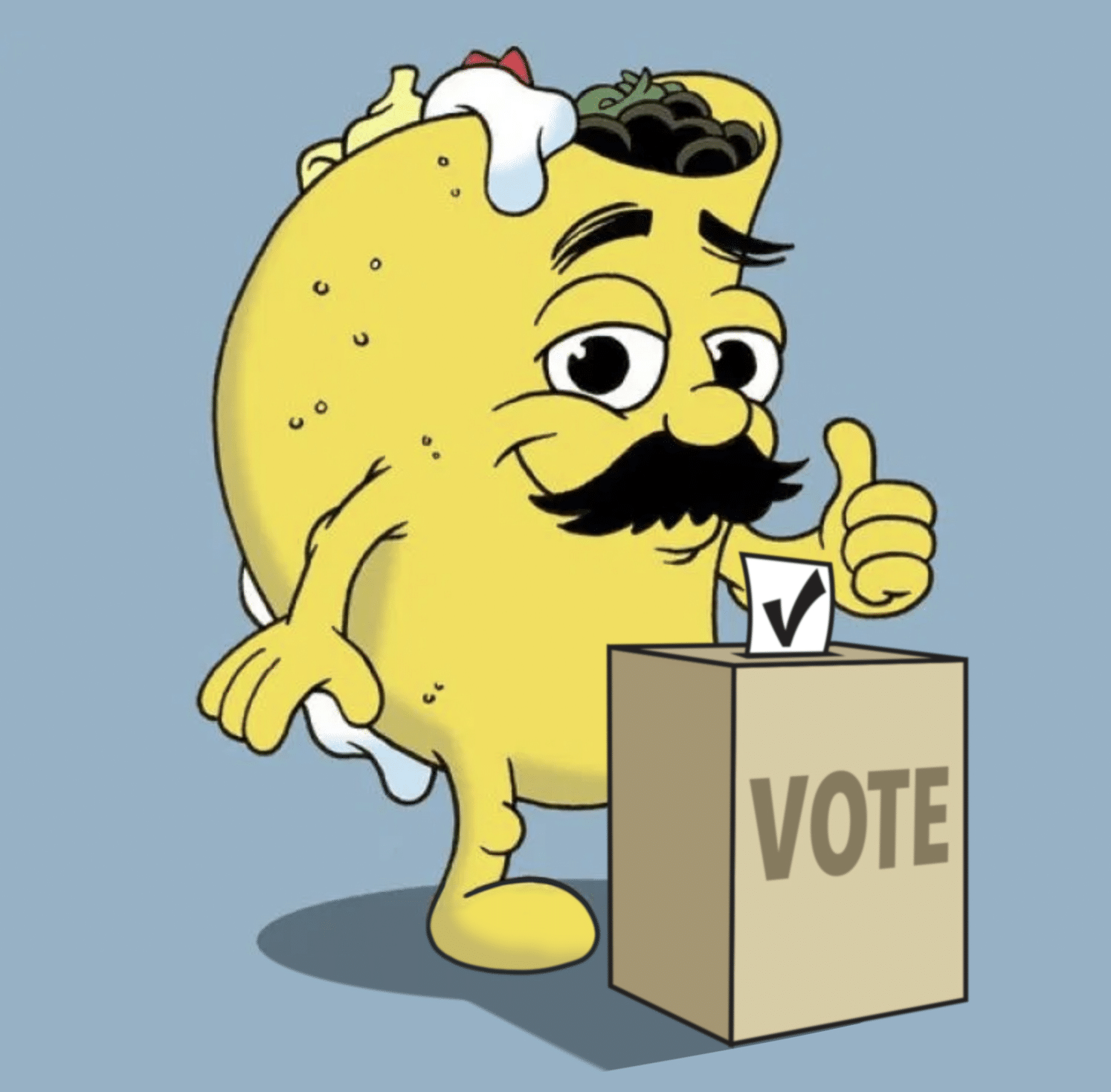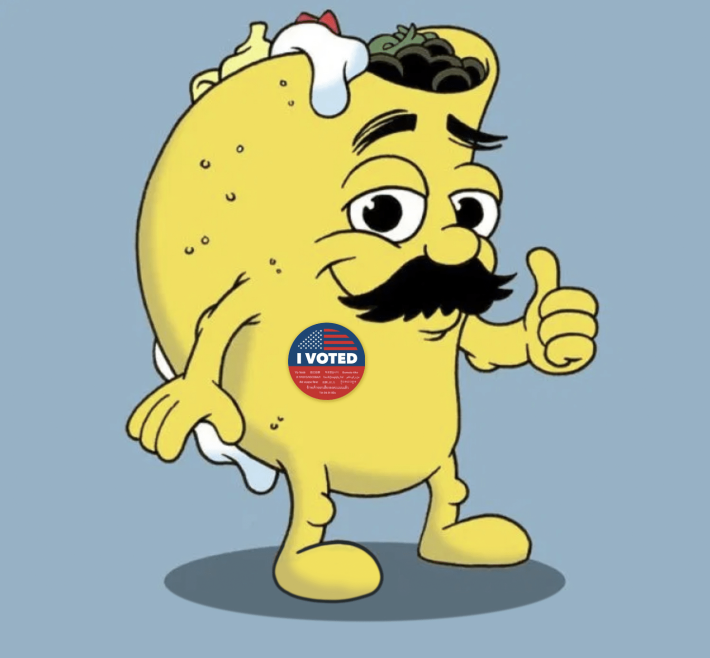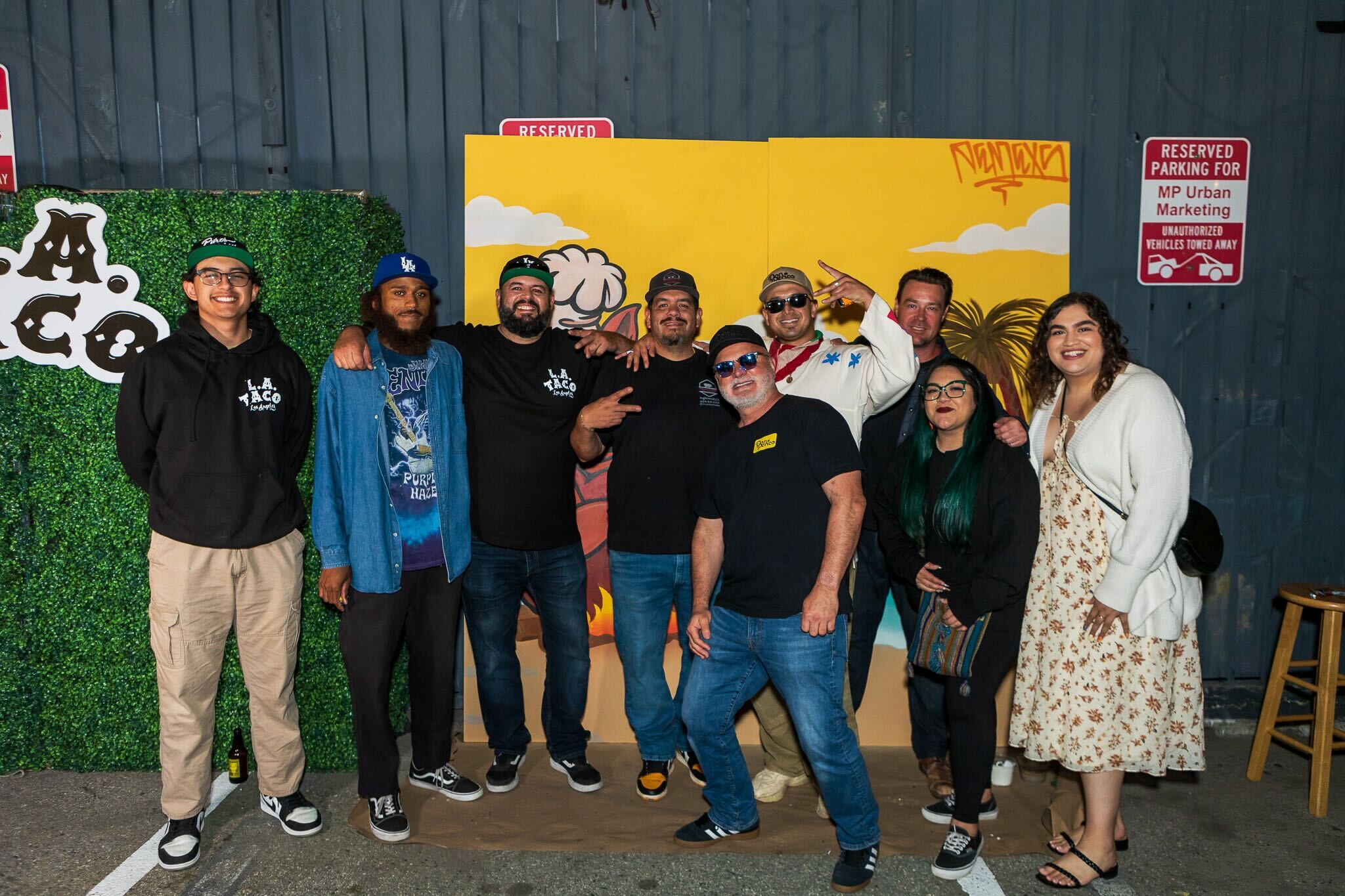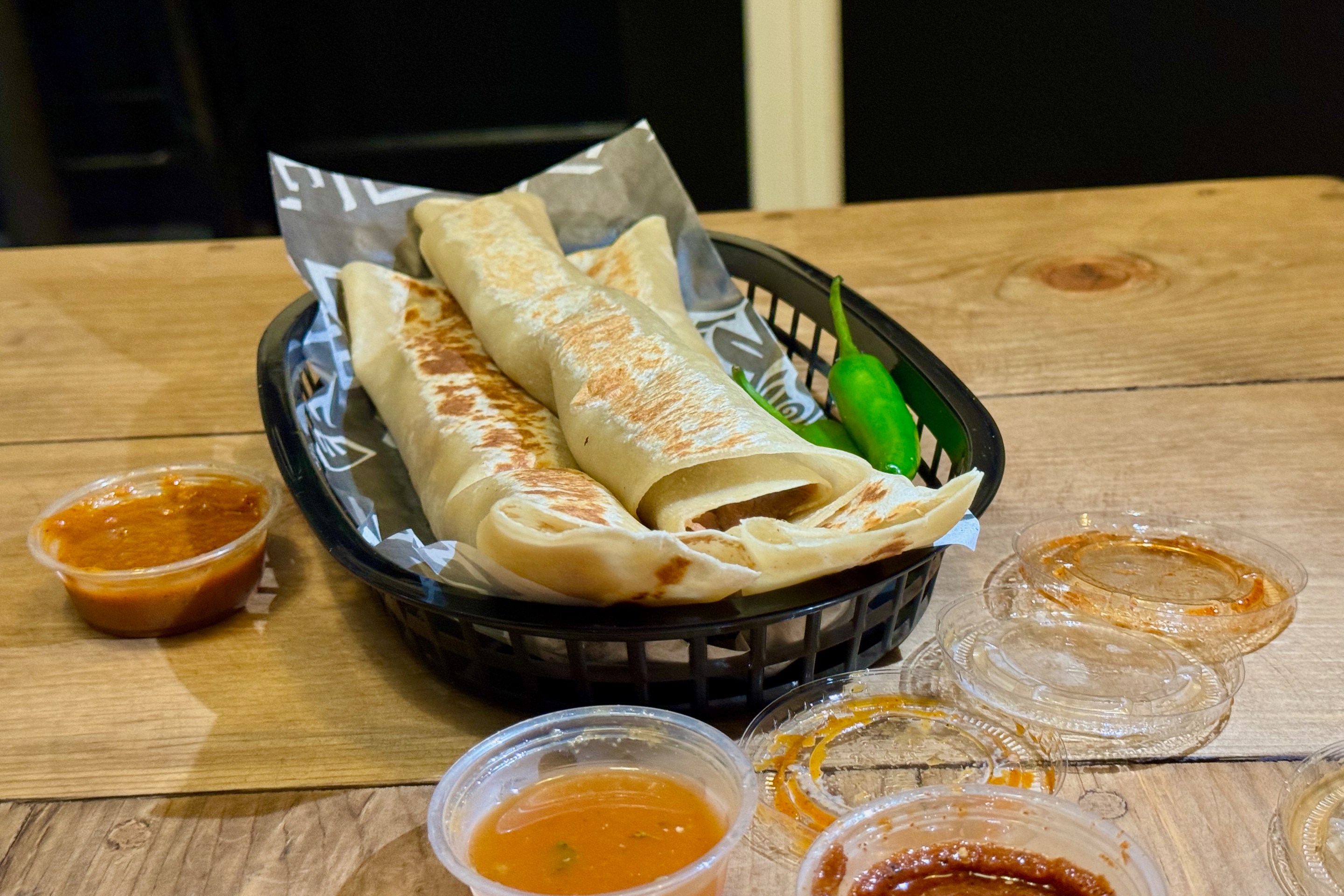L.A. Taco Votes: Your Ultra Last Minute Voter Guide for Los Angeles County

The District Attorney Race
Let’s start with the DA race. It might not be as sexy as the City Council races (yes, local politics is sexy!), but DA 's have almost unchecked power in deciding who is prosecuted in the entirety of Los Angeles County. The DA also decides how laws are prosecuted by their army of city attorneys, including whether or not people are criminalized for simply being unhoused. That’s a huge amount of power in the application of the criminal justice system in the most populous county in the entire country. L.A. County has a bigger population than most states in the union.
Jackie Lacey is the county’s incumbent DA, a position she’s held since 2012. Critics of Lacey, including local social justice reform advocates – and even the L.A. Times – have called her a “punishment first prosecutor.” They point to statistics like the fact that since she got the DA job, 22 people, all of them people of color, have been sentenced to the death penalty from L.A. County. Lacey has a tenure that involves relying heavily on inaccurate and discriminatory gang databases like Street Terrorism Enforcement and Prevention to aggressively prosecute mostly young black and Latinx people swept up in the criminal justice system. Simultaneously, Lacey is much less interested in prosecuting officers involved in police shootings. Only one officer has been prosecuted in her time as DA. Not to mention that this morning, Lacey’s husband brandished a gun on Black Lives Matter protestors who were in front of her home.
Lacey’s two challengers in this race have both positioned themselves directly against this history. Geroge Gascon is the former DA for San Francisco, where he led an effort in the city to stop prosecuting unhoused people for low-level, non-violent offenses. Gascon said he would implement the same policy here in L.A. He specifically cites crimes associated with criminalizing unhoused people, like sex work and public urination, as things he wouldn’t prosecute. Gascon is also interested in limiting sentencing to 15 to 20 years, and working to stop prosecutors from using “gang enhancements” to increase the sentences of people accused of being gang members. Like Lacey though, Gascon didn’t charge a single officer in any police-involved shooting cases in S.F. in his time as DA.
Rachel Rossi is running against both Gascon and Lacey as a progressive candidate. She highlights the fact that she is not a prosecutor but a public defender. Rossi also says she would work to decriminalize nonviolent “crimes of need” associated with homelessness like sleeping on the streets. She’s also interested in setting up a task force to investigate corporate landlords, ending cash bail, and appointing independent prosecutors to investigate officers involved in shootings.
City Council Races
Council District 2
This district covers North Hollywood, Valley Village, Studio City, and East San Fernando Valley.
Paul Krekorian has held this position since 2009. During that time he’s spearheaded the building of the first, and still only, two “navigation centers” for unhoused people in District 2, which aren’t shelters or long term housing, but places where people can shower, use the restroom, and be connected with resources. He says he supports building more affordable housing units as a solution to the housing and homelessness crisis. But he seems much more focused on his work on the city’s Budget and Finance Committee except maybe his support for public transportation.
Krekorian’s contenders for this seat are Rudy Melendez, who literally has no policies or positions listed on his website. The other is Ayinde Jones, who says his most important issues are “empowering families” and homelessness, but not a single policy proposal to go along with those issues.
Council District 4
This district covers Sherman Oaks, Toluca Lake, Hollywood Hills, Los Feliz, Silverlake, Hancock Park, Larchmont, and a part of Koreatown.
One of the most hyped City Council races, and one with some of the most money flying around, District 4 is kind of a microcosm of the election, both countywide and nationwide, between moderate candidates and progressives.
Anyways, David Ryu has held the District 4 council seat since 2015. Along with the rest of the council, Ryu has been focused in the last couple of years on homelessness and housing policy, as he should be. Last year alone Ryu’s district’s unhoused population grew by 53 percent. The policies that have come out of his office have been at times contradictory.
Ryu’s taken credit for spearheading a couple of bridge housing projects, but he also supported a proposed ban on unhoused people sleeping in public. Months later, he said the ban was “bordering on cruel,” after the Ninth Circuit Court of Appeals ruled that legislation criminalizing homelessness is illegal. Ryu has since put out a platform calling for building more housing for unhoused people, supporting affordable housing, including some interesting ideas on restricting landlords’ ability to evict tenants using the Ellis Act, and generally expanding homeless shelters. Ryu has raised more than four times the money his opponents have, including donations from real estate developers, of which he’s pledged to return to those donors.
Raman positioned herself as a steadfast progressive against Ryu’s contradictory history on the council. Raman is the cofounder of SELAH Neighborhood Homeless Coalition, Co-chair of the Silver Lake Neighborhood Council’s Homeless Committee, and the former executive director of Time’s Up Entertainment. Out of all the candidates in this district, Raman has the most detailed and wide reaching plans for what she wants to do, which includes promising to legislate the Department of Water and Power to transition to 100% renewable energy by 2030, mandating a buffer zone of 2,500 feet from oil drilling sites to homes, and creating legislation to codify L.A. as a sanctuary city for undocumented people, among many other polcies.
Sarah Kate Levy places herself kind of in the middle of Ryu and Raman. Levy is the head of the L.A. chapter of the National Women’s Political Caucus, an organization that supports women running for elected political offices. She also was the co-screenwriter on a movie released in 2015 called No Way, Jose, about a 40-year-old L.A. hipster trying to “find himself” starring Adam Goldberg and Gillian Jacobs… anyways, Levy’s main issues as stated on her campaign website are “Housing, transit, and trees.” She wants to establish safe camping and parking spaces for unhoused people with city provided mobile showers, bathrooms, and mental health and addiction counselors, while simultaneously enforcing ordinances on “clean and traversable sidewalks.”
Council District 6
District 6 stretches from Van Nuys to North Hollywood, Arleta to North Hills East, Lake Balboa to Sun Valley, and off to Panorama City.
Nury Martinez has represented District 6 since 2013. She’s the first Latina City Council president. Martinez has campaigned on a “Families First” agenda, a loose set of ideas that she described as to “uplift women and assist families led by parents and single moms working two or three jobs” as well as people who may be on the brink of homelessness.” As part of that policy Martinez has stepped up on anti-sex trafficking policies, bans on no-fault evictions, banning private detention centers in city limits, as well as hyper-aggressive homeless encampment sweeps in the Sepulveda Basin. In a speech to the council at the beginning of the year, Martinez also said she was interested in pursuing a loan program for working families to pay for necessities, and a proposal to expand paid family leave for new parents.
Her main contender in the race is a music studio owner named Bill Haller, whose central themes for his campaign revolves around supporting more public bus lines in District 6. He also wants to reform the way the city is handling the homelessness crisis, which he calls “unspeakably cruel,” while also taking a surprisingly antagonistic stance against street vendors in Arleta. He’s for limiting street vending licenses. He also wants to add more seats to the City Council and lower council member salaries in order to try and get younger, more diverse representatives in office.
The third person in the race is Benito “Benny” Bernal. From what we could gather Bernal was formerly involved with SEIU Local 99, the educational workers union, and his singular issue in this race is framing the homelessness crisis as steaming from a mental health crisis. Bernal wants to force unhoused people into mental health care by rewriting conservatorship laws. Bernal is one of the listed leaders of a change.org petition to recall Mayor Garcetti for his ineffectiveness at dealing with the homelessness crisis. The petition asks President Trump to take federal action to deal with the crisis because “Residents of the City and County of Los Angeles are at an increased risk to violent crime, victimization, disease and unsafe communities in which families can thrive.” The petition was sponsored by Trumpettes USA Inc, a group of Beverly Hills-based Trump supporters. Suffice to say, the petition has yet to hit its goal of 50,000 signatures.
Council District 8:
District 8 covers Baldwin Hills, West Adams, Jefferson Park, Leimert Park, Chesterfield Square, and the Crenshaw neighborhood.
Not many options here, unless you want to write in something funny as a write-in candidate like the swarm of 40,000 Africanized bees in Pasadena. If you do, please let us know who you wrote in. Marqueece Harris-Dawson is the only candidate running in this race.

Council District 10:
District 10 is a big district that covers Koreatown, Arlington Heights, West Adams, South Robertson, West Pico, Wilshire Center, Mid-City, Olympic Park, and Palms.
One of two Districts without incumbents because their terms have run out [bye Herb Wesson!], there’s probably too many candidates running for this seat. So let’s get going early.
Channing Martinez is running in this election to build a “black-Latino third world alliance” according to his website. Martinez is a community organizer with the Labor Community Strategy Center and the Bus Riders’ Union, and the two big policies he’s proposing is cutting the LAPD’s budget by 50% and making public transportation free.
Your next candidate, Mark Ridley-Thomas is the personification of the revolving door that is L.A. politics. He’s running for this seat because his term on the L.A. County Board of Supervisors representing Council District 2, a position he’s held since 2008, is ending this year. Previously, Ridley-Thomas was a California state senator, a member of the State Assembly, and a City Council member. Ridley-Thomas is widely credited with reopening the Martin Luther King Outpatient Center in Willowbrook, he also currently works with Governor Newsom’s on his Council of Regional Homeless Advisors, where he’s pushing for an amendment to the state constitution to give the state the power to sue cities and counties if they don’t house the unhoused. Other than that, he doesn’t really have any policies relating to his own district he wants to represent.
He also famously, with a majority of the other L.A. Board of Supervisors, petitioned the Supreme Court to overturn Martin vs City of Boise, which made it illegal to criminalize sleeping on city streets. He also, allegedly, gave $100,000 to USC to get his son a job on the faculty of the School of Social Work, but hey, who hasn’t?
Melvin Snell describes himself as a businessman, but it’s hard to piece together what exactly that business is. He has incredibly vague plans about fighting for “our forgotten Homeless Society.” But the best part of his website is the description of his campaign’s staff members. Campaign Chairperson Chris Hollins’s description reads “Bring to the table win-win survival strategies to ensure proactive domination. At the end of the day, going forward, a new normal that has evolved from generation X runway.” What? Further down on Snell’s webpage, a banner boldly proclaims “Let’s elect more NP people.” What? Nurse practitioners? Stay tuned for more L.A. Taco coverage on this pressing issue of what the hell is going on at the Melvin Snell campaign?
Shout out to Aura Vasquez for being the first campaign website I’ve seen that’s written in both English and Spanish. Vasquez has a pretty wide-ranging resume, and with it, a wide-ranging set of ideas. Born in Columbia to an Afro-Colombian family, Vasquez says she was inspired by Obama to become a community organizer at Orange County Congregation of Community Organization in Santa Ana where she was involved in the campaign to stop the police from impounding people’s cars, especially immigrants when they couldn’t show ID.
Since then she’s been involved with the city’s efforts to divest from coal-powered energy and has been appointed to a seat on the Board of Commissioners for the L.A. Department of Water and Power, where she championed DWP’s Shared Solar Program to bring solar power to renters. One of her main campaign policies is to end oil and gas drilling in District 10.
And finally, Grace Yoo states right up front on her website in bold that “The first issue I will work on is homelessness and affordable housing. And we need to deal with it now.” The way she plans to deal with those crises is through “smart development” of low income and affordable housing by using empty buildings, emergency shelters, and other vacant and underused spaces to house unhoused people. But back in 2018, Yoo was actively opposed to building a shelter in Koreatown. Yoo wants to create a committee in the city government that has oversight over oil rigs in neighborhoods. She states she’s interested in increasing the city’s Vision Zero implementation, which is trying to prevent pedestrian fatalities by cars, and she’s interested in making public transportation free for seniors and differently abled people.
Council District 12
District 12 encompasses parts of the Northwestern San Fernando Valley, which includes Porter Ranch, Granada Hills, Chatsworth, and Northridge
John Lee is the incumbent for this District, and he’s only been in office since August of 2019. Lee is undoubtedly the most conservative member of the City Council. He changed his party preference from Republican to unaffiliated at the beginning of the year. One of his main fights has been to move, or prevent altogether, the first homeless housing project from being built in his district in Chatsworth. He was ultimately compelled to begin building the project by the rest of the City Council. He’s been adamant in his belief that the homelessness crisis stems from a lack of mental health and a drug epidemic, not a lack of affordable housing or rising rents.
He’s also actively rejected improving public bus lines in his district, and been in favor of aggressive enforcing of fines against unpermitted street vendors. Lee was once against closing the Southern California Gas Company’s natural gas well in Aliso Canyon that was the cause of the massive leak in 2015, but since the new year, he’s stated that he wants to work to close it.
Lee’s opponent Loraine Lundquist has also come out in support of immediately closing the Aliso Canyon gas well. Lundquist is an astrophysicist and a CSU Northridge lecturer who’s positioning herself as a mildly progressive candidate in this historically Republican-leaning district. Lundquist supports homeless housing projects in the district, as well as City Hall’s version of the Green New Deal, and says she wants to come up with incentives for developers to build affordable housing in District 12.
Council District 14
District 14 includes downtown, Boyle Heights, Lincoln Heights, parts of Highland Park and Eagle Rock, and El Sereno
Like District 10, District 14 has a lot of candidates because the incumbent, Jose Huizar has reached his term limit.
Monica Garcia is the first candidate in the race. She’s been an LAUSD board member since 2006, where she worked to pass a 7 billion dollar new school construction bond, which gave a lot of money to charter schools. Garcia’s big idea is to pass another bond measure to build more affordable housing.
John Jimenez is your second candidate. He’s on the Boyle Heights Neighborhood Council, and at a recent debate referred to housing developers as “vampires” sucking the blood of people of the neighborhood. Jimenez says he wants to audit the city to find out where the money for housing bonds and education spending are being siphoned off to.
If you’re an Angeleno, you’ve at least heard Kevin de León’s name. He was a former state senator, a state assemblymember, and before that, an activist. De Leon has staked a lot of his political image on being both a political insider who understands the process of local politics and governance, while at the same time a scrappy progressive outsider who’s closer to people than politicians. His big idea is to build cheaper, “prefabricated modular housing units” to solve the homelessness crisis. Would it surprise you to know that he’s received a good chunk of his campaign’s money from local housing developers?
Next, Cyndi Otteson is the board president of Miry’s List, a nonprofit that links newly arrived refugees with resources, and a marketing executive. Otteson wants to be able to tax developers for having vacant, unaffordable, apartments. She also advocates for a rent freeze, a municipal bank that would cover first and last month’s rent for people struggling with rent, and some kind of, unfortunately vaguely defined, stricter regulation on industrial operations and refiners in District 14 and “make them pay their fare share.”
Finally, Raquel Zamora is an LAUSD teacher, school counselor, social worker, and a part of the family that owns the Zamora Brothers restaurant. Zamora is concerned with gentrification and rising rents pushing people into homelessness in District 14, but other than saying she wants to pilot a study to study why people fall into homelessness, she doesn’t have many hard policies publically available to address that.
The Propositions
Measure FD
This measure asks voters whether or not they want to tax all residential and commercial property in the county 6 cents per square foot to provide the L.A. County Fire Department an additional 34 million dollars to upgrade equipment and hire more firefighters and paramedics.
Measure R
After decades (maybe even centuries?) of scandals, the L.A. County Board of Supervisors, because of the advocacy of a coalition of local activist groups including Patrisse Cullors of Black Lives Matter, created the Sheriff Civilian Oversight Commission in 2016. Measure R would give that Commission the subpoena power to investigate police shootings and other uses of force and allow the Commission to come up with a plan to reduce jail populations, alternatives to incarceration, and community-based mental health care.
Proposition 13
This is a statewide measure that has the unfortunate, or maybe ironic, fate to share its name with the 1978 proposition that decreased property taxes and decimated the funding for California public schools. Anyways, Prop 13 this time around is a bond measure to give 15 billion dollars to schools in the state, including nine billion to preschools and K-12 schools, including 500 million dollars to charter schools, four billion to universities, and two billion to universities. To add to the divine comedy of the whole thing, one of the major opponents of the Proposition is the president of the Howard Jarvis Taxpayers Association, the main proponent of the original Prop 13 in 1978 that so decimated public school funding in the state.
L.A. Board of Supervisors
One more group of races to go, but his one is a really important one. The five members of the L.A. Board of Supervisors controls a 36 billion dollar budget relating to social services for over 10 million L.A. County residents.
District 2
District 2 covers Compton, Carson, Inglewood, Culver City, Lynwood, Watts, and West Adams among other cities and neighborhoods. The most contentious race, District 2 has been represented by Mark Ridley-Thomas since 2008, who is now running up against a term limit, so you already know that there’s going to be a hell of a lot of candidates for this seat.
Jake Jeong is probably best known as leading the campaign against a homeless shelter in Koreatown in 2018. His big ideas are to build more “modular” housing units, build more childcare centers, and starting “private hearings” for undocumented people in court to prevent I.C.E. court arrests.
Next, Holly Mitchell is a state Senator representing Culver City and parts of Inglewood, where she won additional funding for a public health program that bridges maternal care for black mothers to advocacy for public housing and against medical racism. Now she’s running on a platform that includes a housing first agenda to address the homelessness crisis, creating a “housing stabilization loans” for people in danger of being evicted, and coming up with an “anti-speculation plan” to prevent against people getting kicked out of their homes because of gentrification.
Jan Perry represented City Council District 9 from 2001 to 2013, and since then she’s been involved in other city agencies. Perry says housing and homelessness are her biggest concerns, which she wants to solve by working with the state and the federal government to deliver a “Marshall Plan type of program,” but she doesn’t offer up any specifics about what that Marshall Plan would look like or include.
Lastly, eight-year City Councilmember Herb Wesson. Wesson purposes creating a rental assistance program to provide short term loans for people facing eviction, closing “loopholes” in the Ellis Act that allows landlords from evicting tenants, building affordable housing on county land, including using 3-D printed construction materials and recycled shipping containers, and creating “anti-displacement zones” near-luxury housing developments, but whatever that means has been left undefined.
District 4
District 4 encompasses San Pedro, Long Beach, Norwalk, Paramount, up to Whittier and Santa Fe Springs.
Neither Janice Hahn, who has represented the district since 2016, or her contender in this race, attorney Desiree T. Washington, has a much stated policy agenda to point toward. Hahn has worked to get basic services for the unhoused, like one temporary shelter in San Pedro, while Washington’s homeless policy just says she would educate “residents about existing housing, mental health and physical rehabilitation services. Washington also believes that undocumented citizens are being “unfairly favored over US citizens.”
District 5
District 5 is the largest district in the county, covering a majority of the communities in the San Gabriel Valley like Pasadena, the San Fernando Valley, the Antelope Valley, and Santa Clarita.
John C. Harabedian is the mayor of Sierra Madre who wants to “immediately” erect temporary homeless shelters on vacant county land for the unhoused. He also wants to provide tax rebates to people who house low-income and unhoused residents in their own homes, and advocate for “robust tenant protection and rent stabilization measures,” but he leaves those exact details of policy unexplained. He also says he wants to kick I.C.E. out of any county affiliate program and establish a “housing czar” to work between county departments to build more housing.
Darrell Park’s big issue is the environment. He wants to convert 95% of county-owned passenger vehicles to electric vehicles by 2023, plant a million trees, ban fracking, shut down the Aliso Canyon natural gas well, get Antelope valley operating on 100% renewable energy by 2025, then the entire county by 2030. He wants to make public transportation free and donate half of his salary to ending homelessness in the county. But his plans to do any of that aren’t stated anywhere publically.
Kathryn Barger has represented the district since 2016, and she’s the current chair of the Board. In her time on the Board, Barger has taken to task the Los Angeles Homeless Services Authority for not housing the unhoused more quickly and worked to open more parks and open public spaces in her district.
Mariah Castañeda contributed to this report.
Read More:
Stay in touch
Sign up for our free newsletter
More from L.A. TACO
An Update On Our Membership Drive: Some Bad News, and Good News
Some bad news, and some good news on our pledge to survive and stay sustainable.
Where To Eat This Weekend: Bulgogi Pupusas, Hemp Seed Guacamole, ‘Sticky Rice Sticks,’ and Korean Street Food In Venice
Plus an Roman chef veteran in a Hollywood apartment, chocolate Cuba Libres, Uzbeki plov with lazer rice, and cochinita melts in a Silver Lake yard. Here are the best things to eat around Los Angeles (and San Juan Capistrano!) this weekend.
How Your Business Can Benefit From Sponsoring L.A. TACO
When your company sponsors L.A. TACO, you receive a variety of quick and cost-effective benefits for far less than what we price our traditional advertisements and social media mentions at.
Juárez-Style Burritos Have Arrived in Southern California, And They are Already Selling Out In Less than An Hour
The month-old strip mall taquería in Anaheim make all their flour tortillas from scratch using both lard and butter, resulting in an extremely tender vehicle for their juicy guisados like carne en su jugo, carne deshebrada, chile colorado, chile relleno, and chicharrón. Every tortilla is cooked to order, too.




